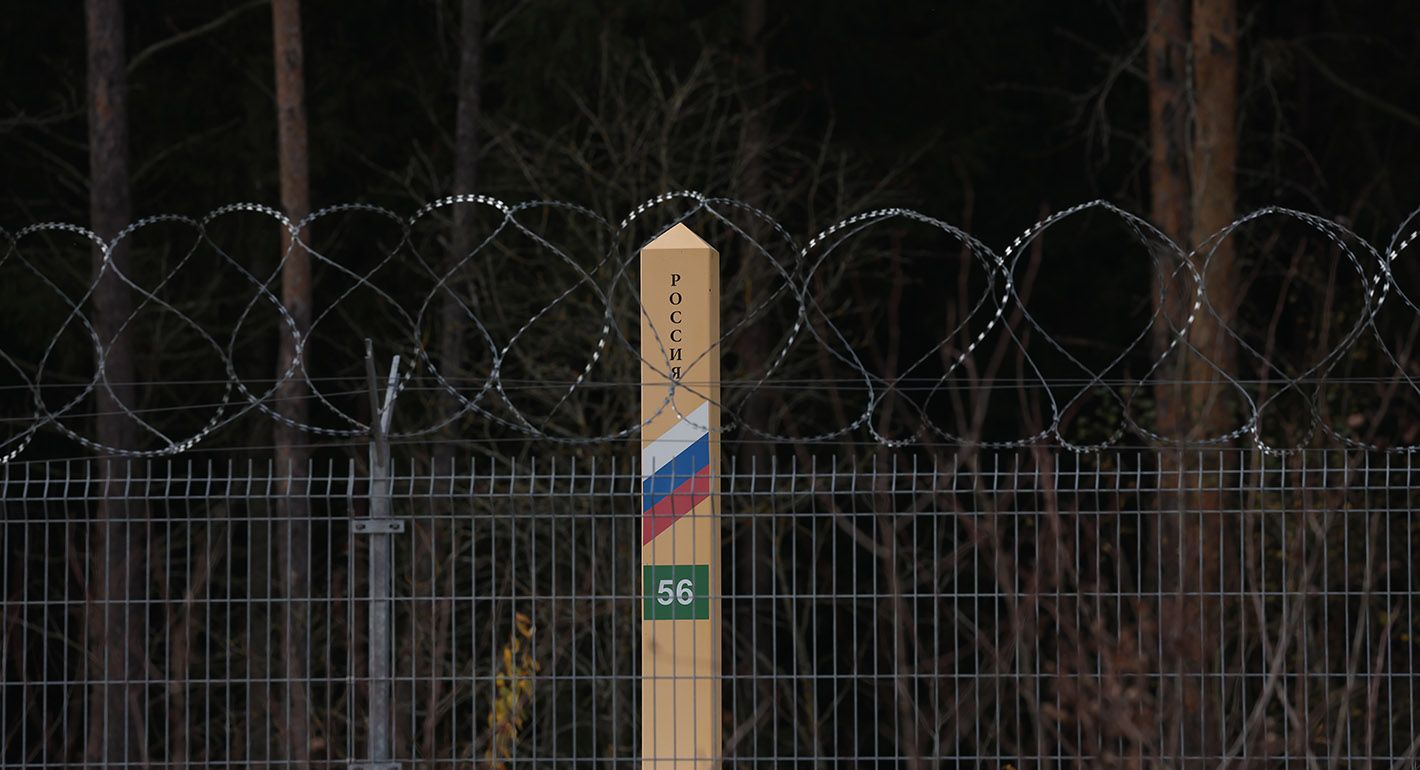Arms supplies from Russia to Iran will not only continue, but could grow significantly if Russia gets the opportunity.
Nikita Smagin
{
"authors": [
"Emil Kamalov",
"Ivetta Sergeeva"
],
"type": "commentary",
"blog": "Carnegie Politika",
"centerAffiliationAll": "",
"centers": [
"Carnegie Endowment for International Peace",
"Carnegie Russia Eurasia Center"
],
"englishNewsletterAll": "",
"nonEnglishNewsletterAll": "",
"primaryCenter": "Carnegie Russia Eurasia Center",
"programAffiliation": "",
"programs": [],
"projects": [],
"regions": [
"Russia"
],
"topics": [
"Migration",
"Domestic Politics",
"Civil Society"
]
}
Source: Sean Gallup / Getty Images
Although mass repressive measures against emigres are regularly discussed in the corridors of power, none of these ideas have been introduced, possibly because the Russian regime is not interested in scaring away the entire diaspora. Instead, it needs to lure certain individuals back home while continuing to pressure “troublemakers” abroad.
Recent studies show that 15 percent to 45 percent of Russian emigrants have returned to Russia, and the process is expected to continue, prompting speculation that Russia is gradually reversing its brain drain following the 2022 migration crisis. Yet interpreting the available data and the political significance of these trends is not as straightforward as it may seem. First, the numbers may not accurately reflect the situation, and second, the current circumstances for emigration are highly dynamic compared to previous waves and could change at any moment.
Although numbers on returning Russian nationals may be useful, they are not conclusive evidence of migration flows. Migration in general is a major methodological challenge for researchers, and none of the samples used are fully representative of the entire post-2022 Russian émigré community. In addition, for some of the most sensational numbers on returnees quoted by the media, there is no transparent research methodology available to the public, making it hard to judge how accurate those numbers are. Even if the numbers are taken at face value, there are many other considerations to take into account.
For one thing, returning is often a temporary option in order to regroup and gather the resources for a new attempt at emigration. According to data from the OutRush research project, of the 16 percent of respondents who returned to Russia between March 2022 and September 2022, around 80 percent had emigrated once again by summer 2023. For some, organizing a new attempt to leave may take years, not months.
It is also important to note that migration creates self-perpetuating and continuing processes: current migrants will help and encourage friends and family still in Russia to leave, often increasing the migration flows. Moreover, those who hold anti-regime political attitudes—especially those persecuted for their political stance or who have suffered due to the political situation—are significantly more likely to receive support from the Russian migrant community, further perpetuating the politically motivated migration process. Another factor not represented by the numbers is that while many Russian migrants may physically reside in one location, their thoughts, emotions, and aspirations may be connected to other places, or even multiple locations simultaneously. This complex migrant sense of belonging may significantly shape the future of this migration wave.
What is seldom mentioned in headlines about returning Russians is the existence of various transitional statuses beyond the binary choices of “remained in emigration” and “returned to Russia.” Among such intermediary statuses are those of commuting and working remotely. At least 14 percent of Russian emigrants regularly commute to Russia, and 32 percent plan to travel to Russia for work while living abroad. Around 15 percent of Russian emigrants abroad are still employed by Russian organizations. These swing migrants maintain strong economic, social, and cultural ties with both their host community and their home country, and it’s unclear which country they will ultimately choose to settle in.
Additionally, even amid the challenging circumstances in which many Russian emigrants find themselves, the decision to return to Russia is not always their first choice. Many initially seek another country to continue their exile: according to OutRush data, approximately 14 percent of Russian emigrants changed countries between September 2022 and the summer of 2023. In the future, we can anticipate ongoing mobility, both among host countries and between those countries and Russia.
The arrival of immigrants from authoritarian regimes poses a conundrum for the governments of host countries: Are these populations a brain gain, a potential political asset, or a security threat?
A significant portion of the post-2022 Russian exiles is highly educated, urbanized, and mobile, making them a valuable long-term human capital acquisition for host communities. The leaders of some Western countries were quick to state that they would be happy to capitalize on this sudden influx. Additionally, for many of these politically active and well-connected individuals, emigration is simply an extension of their political activism back home. They are a significant political asset for countries interested in supporting the Russian opposition by creating democratic hubs for it.
Still, the integration of these individuals may present a challenge even for democracies. Although professional migrants usually do not cause the same pushback from local populations as low-skilled migrants, they still compete with locals in high-paying fields, which may spark resentment in the host countries. In some countries, an influx of affluent migrants may cause gentrification and contribute to inequality, once again fueling local resentment.
People fleeing aggressor countries additionally raise security concerns for their hosts, outweighing any potential economic gains and prompting some countries to close their borders to immigrants from specific nations. Some believe that Russia could use its nationals abroad for espionage; others are afraid that an influx of Russian nationals provides Russia with a pretext to “protect” their interests militarily. Meanwhile, countries that enjoy good relations with Russia may hesitate to integrate potential “troublemakers” for the Russian regime. Ultimately, the problem of Russian migration is closely related to the so-called “liberal paradox”: for certain countries, political and security concerns outweigh the potential economic gain of admitting Russian migrants.
Russian emigrants are showing progress in terms of both social and economic integration. Still, a concerning number are trapped in precarious and uncertain circumstances, lacking access to basic rights and services. Many are affected by international sanctions against Russia and encounter problems in local institutions, especially banks. Forty-five percent reported experiencing discrimination: a much higher number compared to average levels reported by migrants in Europe. More than half of those who changed their host country between September 2022 and summer 2023 cited discrimination as a factor in doing so.
Moving to a new country in response to discrimination is mostly only an option for the most privileged, such as affluent workers at international companies. For other, less mobile migrants, poor conditions and hostility can significantly hinder their integration, potentially contributing to their isolation and decision to return to Russia.
Emigration is not only a chance for people to find a better place abroad, but also a tool that autocracies strategically use for their own benefit. Studies show that the unrestricted emigration of political activists acts as a pressure valve, helping to reduce dissent, undermine the opposition’s capacity for domestic political mobilization, and tighten autocratic control.
At the same time, politically motivated emigration presents two new problems for autocrats. First, the political opposition does not necessarily stop its activities once abroad, and politically motivated emigration is a self-perpetuating and continuing process: those currently in emigration will help those still in Russia to leave. They create multiple organizations to send political remittances back home, continue to speak out, engage with host countries, and influence their immediate circles at home. The available data show that immediately upon fleeing abroad, Russian emigrants rallied on the streets, donated to NGOs, and helped each other. The opposition in exile may be harder to control, especially if it is far from the autocratic reach and protected by democratic host countries.
Secondly, Russia’s emigration crisis doesn’t just concern political activists, but is also leading to a critical loss of essential workforce segments, including IT professionals, managers, academics, and entrepreneurs. One way for autocracies to deal with such a brain drain is through emigration restrictions, although there are so far no indications of this being used en masse in contemporary Russia. Instead, travel restrictions apply selectively to certain state employees and conscripted individuals.
Still, there are some signs that the Russian government is concerned about the brain drain and is interested in attracting talented individuals back. Although mass repressive measures against emigres are regularly discussed in the corridors of power, none of these ideas have been introduced, possibly because the Russian regime is not interested in scaring away the entire diaspora. Instead, it needs to lure certain individuals back home while continuing to pressure “troublemakers” abroad.
A study of refugees in Lebanon shows that personal security is a more important consideration than economic opportunities when deciding to return home: if people fear for their safety, returning is simply not an option. While Russia offers exemptions from mobilization for specific professional groups, no one is guaranteed immunity from repression. Whether or not Russian emigrants will consider going back to Russia depends very heavily on perceptions of personal risk, and currently, more than 70 percent of Russian emigrants are afraid of repression from the Russian government.
Finding themselves between a rock and a hard place, emigrants make strategic choices that are not necessarily final within a wide spectrum of options. Their mobility depends heavily on the environments of the host and home societies, the real and perceived threats in both countries, and the strategies employed by migrant communities for adaptation and building resilience. In such circumstances, what appears to be a return might be a strategic retreat ahead of a new attempt at emigration, and what appears to be long-term integration in a host country could be an intermediate point for further emigration. The process is neither linear nor conclusive, and the immediate number of returnees should not dictate political actions or their absence.

Emil Kamalov
PhD researcher in the Department of Political and Social Sciences at the European University Institute (Florence, Italy)

Ivetta Sergeeva
PhD researcher in the Department of Political and Social Sciences at the European University Institute (Florence, Italy)
Carnegie does not take institutional positions on public policy issues; the views represented herein are those of the author(s) and do not necessarily reflect the views of Carnegie, its staff, or its trustees.
Arms supplies from Russia to Iran will not only continue, but could grow significantly if Russia gets the opportunity.

Nikita Smagin
The use of technology to mobilize Russians to vote—a system tied to the relative material well-being of the electorate, its high dependence on the state, and a far-reaching system of digital control—is breaking down.

Andrey Pertsev
Putin is stalling, waiting for a breakthrough on the front lines or a grand bargain in which Trump will give him something more than Ukraine in exchange for concessions on Ukraine. And if that doesn’t happen, the conflict could be expanded beyond Ukraine.

Alexander Baunov
As discussions about settlement and elections move from speculation to preparation, Kyiv will have to manage not only the battlefield, but also the terms of political transition. The thaw will not resolve underlying tensions; it will only expose them more clearly.

Balázs Jarábik
Disillusioned with the West over Gaza, Arab countries are not only trading more with Russia; they are also more willing to criticize Kyiv.

Ruslan Suleymanov